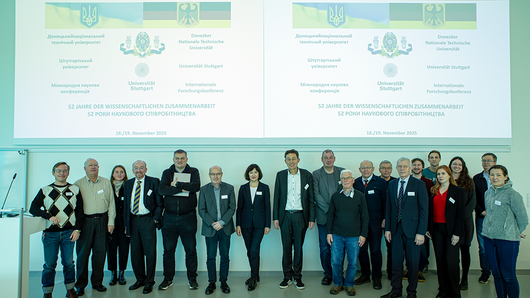High-Performance Computing Center Stuttgart

On November 18-19, 2025, the High-Performance Computing Center Stuttgart (HLRS) hosted a conference celebrating 52 years of German-Ukrainian scientific partnership. In introductory remarks, DonNTU Vice President Prof. Iryna Shvets highlighted its importance, particularly during wartime, saying, "When universities support one another, when colleagues reach out across borders, it gives us strength, it gives us hope, and it gives the energy to keep moving forward.“
Over two days, scientists participated both at HLRS and streaming online from Ukraine, presenting their recent research and the open questions it has raised. One area of emphasis was on applications of artificial intelligence for simulation and data analysis. Several talks also demonstrated the relevance of scientific research in the context of the ongoing war, considering topics such as mathematical modeling in energy resource management, artificial intelligence for threat assessment and risk analysis, scenario planning for a post-conflict Ukraine, and strategies for improving computer network security. Other presentations focused on topics in fields such as environmental protection, education, and linguistics.

Among the conference participants was Dr. Volodymyr Svjatnyj, Professor of Simulation Science, Head of the Department of Computer Engineering at DonNTU, and the driving force behind the longstanding partnership with Stuttgart. Participating from Kyiv, he pointed out that the collaboration has enabled a total of 107 Ukrainian students to visit the University of Stuttgart.
This partnership entered a new phase in September of this year, when the University of Stuttgart announced a new initiative called StuttWay4Ukraine. As University International Center Head Marion Höcke explained, this DAAD-funded project will facilitate academic cooperation between Stuttgart and Ukraine in a sustainable way, with the goals of supporting postwar reconstruction in Ukrainian higher education. HLRS is participating in StuttWay4Ukraine alongside other University of Stuttgart research centers, including the Institute of Educational Science, the Institute for Sanitary Engineering, Water Quality, and Solid Waste Management, the Institute of Linguistics, and the Language Center, with its program in German as a Foreign Language.
"In these challenging times for Ukraine, when we are defending our sovereignty against Russian aggression, maintaining and strengthening academic and scientific ties between our countries is more important than ever,“ said Prof. Oleh Matviykiv, First Vice-Rector of Lviv Polytechnic National University. He thanked the organizers of the collaboration for their continuing support, remarking, "Your openness and your commitment provides invaluable help for our academic community.“
— Christopher Williams